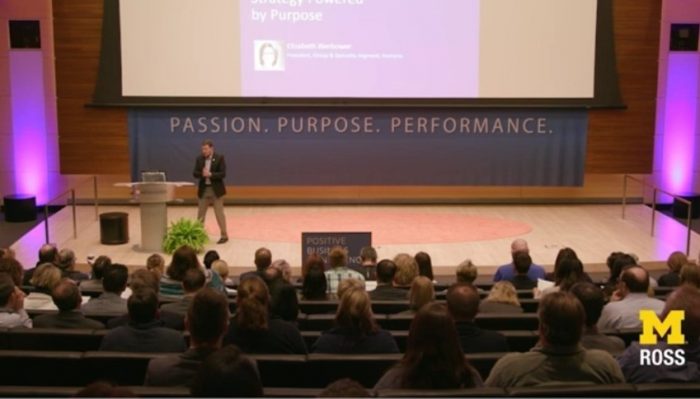
Sheri Fillip, audiovisual expert at the Ross School of Business, helps people accomplish their goals for events at Robertson Auditorium, Blau Colloquium, Tauber Colloquium, Corner Commons, and in classrooms. In this MITN interview, she shares how her team prepares and executes large events like Hacks with Friends.
Tell us about your role as an operations scheduler and coordinator.
My main responsibilities are scheduling and coordinating all of the audiovisual (AV) equipment for classes and events at the Ross School of Business. That can range from assisting someone in selecting the proper location for their event to scheduling all of their AV equipment, as well as making recommendations for what they need to achieve the best outcome.
How does classroom setup differ from an event hosted in an auditorium?
Classrooms have basic sets of equipment. Somebody might need an extra microphone or an extra piece of equipment that might not be standard. They might also need recording services, which we can do through Mediasite. Videoconferencing is another thing we can do, as well as live stream.
The Auditorium and the Colloquium tend to get a bit more complicated. Robertson Auditorium is not as user-friendly. It requires someone in the control room. In Robertson, we might run the slideshow. In a classroom, users are expected to do that on their own. In the auditorium we can also stream to other classrooms for overflow. So, for the most part, it involves providing the same types of services, just in a different way.

Hacks with Friends is a major annual event for the Michigan IT community, most recently held at Michigan Ross March 5 and 6, 2020. Did you have a role in that event?
A big role. I was responsible for reserving all of the breakout rooms and auditorium. I set up the equipment, determined what AV we needed, coordinated the live streaming, and scheduled all of that. So, I was pretty tied up for several weeks.
I also arranged support for the event, because we had three techs in the room at that particular time. I was assigning rooms for people to do their hacks, while I had another technician who was running the show, and handling the live stream.
This sounds like a lot of work!
It was well worth it to see everybody get together like that, and to potentially come up with solutions to issues that we might all have within this university. I’ve been part of Hacks with Friends for the last four years since it has been held at Ross.
Working at Hacks with Friends was well worth it to see everybody get together and potentially come up with solutions to issues that we might all have.
Who else supports Hacks with Friends behind the scenes?
My supervisor, Chris Visel, instructional support manager, was running equipment from the podium as well as assigning the classrooms. Ryan McKenzie, our coworker and AV technician, was in the booth doing the live stream and controlling the projectors. We also had desktop support staff in the study rooms. So, basically our whole department was working. Most people truly enjoy it, and they enjoy being a part of it.
What do you enjoy most about your job or what gives you the most satisfaction?
One thing is the human interaction. I like to be able to communicate with individuals to help them create the desired effect that they’re looking for. And then, just the satisfaction of it coming off correctly, when everything’s working well. Those are the pieces I take the most pride in.
It’s always nice to be able to say, “I know what you want to do, but I have a better way you can do that.” One of my goals is to create the best format for events, so that it looks more professional. I always like to hear about the kudos people receive after their event.
We’re an educational institution. We pull a lot of magic tricks to make things happen and do some of these major events.
What is the biggest challenge you face in your work?
The biggest challenge is helping people understand why a certain event set up will produce a better result than what they have in mind.
I have some major events with high power needs, and it’s a matter of trying to figure out where I can pull all of the power from without “blowing the building.” You know, we’re an educational institution. So we pull a lot of magic tricks to make things happen and do some of these major events. I have to figure out the proper places where I can feed the power that won’t result in tripping circuit breakers. Most times we are able to work things out and provide what is needed, but it does take a lot of work to get that figured out.
Are there other groups within Ross or across the university that you collaborate with as you coordinate events?
I work with Ross Operations and Facilities. If there’s something they are not clear on, they bring in others from U-M, such as electricians. If you’re running a tech showcase, you definitely don’t want to lose power. That kind of kills the whole thing. So, we work to resolve potential issues before an event.
I also work a lot with Michigan Media and outside vendors, including other university groups or video companies. One example is for live captioning during events. I work with these groups to help connect their equipment and monitors to power and live Ethernet ports in our facility. Other times network changes need to be made to accommodate vendors’ needs.

How does your work impact the university?
I think it has a huge impact. All of the events and special activities…without the assistance, I don’t think they would turn out as well. I’m able to provide extra ideas and thoughts as to how they could do things. We’ve had a lot of good results. We do a lot of work with Executive Education, EMBA, MBA, BBA, and other programs here at Ross.
What do you look for in choosing to implement new tech or trends into your area?
That could be anything from interest by another individual to something that we would see as a benefit to the community. Oftentimes, we’ll get a consensus from faculty and staff who are willing to give us their input. And if everything looks like a good match, we might implement it. We check into it and run it ourselves.
If you’re running a tech showcase, you definitely don’t want to lose power. That kind of kills the whole thing.
How has your role changed since the COVID-19 pandemic?
What I do hasn’t changed so much as how I do it. I’m not doing so much in-room scheduling and coordinating as I am scheduling and coordinating videoconferencing and live streaming. I also support training for end users to make sure that they are comfortable with AV technology and have a good understanding of what they want to do and how to accomplish it.
We have had to take everything virtual. That has me really getting involved to make it happen. We have education webinars with well over 2,000 participants. Of course, now they’re switching over from BlueJeans to Zoom. So, I train people on how to do those. Most times I join the events, just to make sure that everything goes well, and I help with last-minute changes, fixes, and recording.
A lot of that has a huge impact on everything that we do, internationally. I think it helps keep us on top.
How did you get into this type of work?
I literally fell into it. I used to work at Michigan Medicine as a med tech doing blood work for transplants. I ended up coming here to the Business School and spent my first year here in faculty support. Because of my knowledge at that point in time, and all of my software skills which were self taught, I was recruited into Computing Services (now Ross IT).
Since then, I’ve moved into different roles as needed, starting from Computing Services lab manager where I ran the students computing lab.
What do you do in your down time or what do you do for fun?
I do a lot of baking around the holidays. I have a dog and two cats that occupy a lot of my time. I have a husband and I’m always helping him with his tech needs. I sew, crochet, and knit. I also like to watch a lot of sci-fi.
